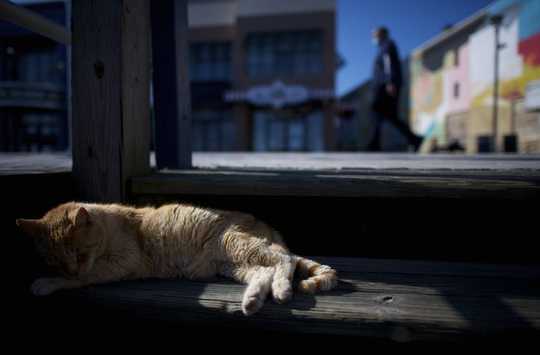 A cat basks in the New Jersey sunshine amid coronavirus lockdown. Mark Makela/Getty Image
A cat basks in the New Jersey sunshine amid coronavirus lockdown. Mark Makela/Getty Image
A lot of people are facing ethical decisions about their daily life as a result of the coronavirus. Ethicist Lee McIntyre answers the question of the moral dilemmas we face.
I take care of stray cats outside by giving them food. At the moment, they may have more difficulty finding food as the restaurants and cafes are closed. I don’t know if I have COVID-19 or not. But let’s say I did: Would it be OK to go out and still feed them? I do wear a mask and observe social distancing. – Berrin K., Turkey
I congratulate you for thinking of others – both human and otherwise – during the COVID-19 crisis. In his various works on animal rights, utilitarian philosopher Peter Singer makes the argument that when trying to figure out the greatest good for the greatest number – which is central to utilitarianism – we should be sure to include the welfare of animals, too.
Of course, there is pushback to his position. If we care for animals, is that because we believe we have a duty to them, or is this just charity? If the former, does that mean I might be required to give up some of my own “utiles” – the utilitarians’ measure of happiness – in the interest of animals? If so, how much? And does that mean animals are my equal?
Get The Latest By Email
Singer says “yes” – it is a duty to consider animal welfare as equal to one’s own, and the debate in ethics rages on.
For your own situation, whether it is motivated by a sense of duty or just a kind heart, I can’t see how it is anything other than thoughtful for you to feed the neighborhood cats when their normal food sources have dried up. Just as many people these days are adopting a shelter dog or cat who might not have a home throughout the pandemic, you are taking care of feral animals who need help too.
I’m not quite sure how COVID-19 figures into this, though. Even if you were contagious, what is your particular concern? That you’d infect the cats? This isn’t a groundless concern. There is now some evidence – confirmed by the U.S. Centers for Disease Control and Prevention – of human-to-animal transmission.
If, on the other hand, you’re concerned about other humans, there are additional ways to mitigate risk such as choosing what time you go out, where to leave the food and so on.
Whatever your concern, I’d say to continue following the CDC guidelines of wearing a mask and social distancing, to minimize the risk both to yourself and others, feline or human. Once you’ve done that, your conscience can be clear. As you’ve already demonstrated through your question though, a warm heart need not preempt prudence.
About The Author
Lee McIntyre, Research Fellow, Center for Philosophy and History of Science, Boston University
This article is republished from The Conversation under a Creative Commons license. Read the original article.
books_pets







